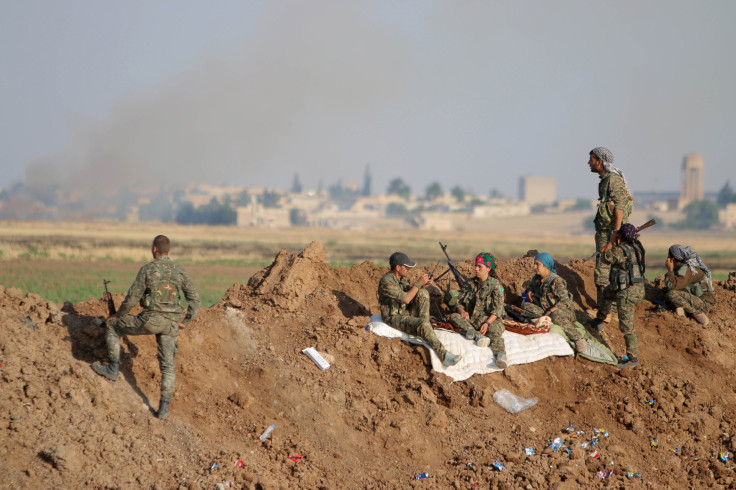Kurds Advance In ISIS-Controlled Tel Abyad, As Rebels Attack Regime Stronghold In Aleppo City

Syrian Kurdish fighters clashed with the Islamic State group in a key town on the border between Syria and Turkey over the weekend, backed by American-led coalition airstrikes. In the neighboring Aleppo province, rebels reportedly shelled the regime stronghold of Aleppo, the biggest city in Syria, killing dozens.
Photos of triumphant fighters holding up the Kurdish People’s Protection Units (YPG) flag in Tel Abyad circulated on pro-Kurdish social media accounts on Monday, as fighters regained large parts of the city on the border. If Kurdish fighters are able to fully seize Tel Abyad, they will be able to consolidate territory they hold in a self-proclaimed autonomous Kurdish zone on the border with Turkey, between the towns of Kobani and Hasakah. Seizing Tel Abyad also would be a significant blow the Islamic State group, interrupting its supply lines between Syria and Turkey, which have been a major source of materials and supplies for the group also known as ISIS.
And down goes the #ISIS welcome sign to #TelAbyad, as #YPG fighters gain more and more ground pic.twitter.com/szbhd3VElN
— Anna Ahronheim (@AAhronheim) June 15, 2015“If successful, ongoing Kurdish advances along this corridor would greatly increase the scope of the self-proclaimed Kurdish autonomous zone of Rojava -- a development that would likely prompt backlash from Turkey,” according to a report from the Institute for the Study of War.
ISIS was confined to certain areas of the town on Monday afternoon, when Kurdish and rebel fighters advanced toward a key border crossing between Turkey and Syria, according to the Syrian Observatory for Human Rights.
"Our advance is slow because there is a large concentration of Daesh forces inside the town and because of the large numbers of mines and booby traps they planted on the road," YPG spokesman Redur Khalil told the Associated Press, using the Arabic acronym for ISIS.
American-led coalition aircraft reportedly joined the operation and conducted airstrikes in the area. Tweets appeared on Monday from people saying they had photographed coalition aircraft over Tel Abyad; in one of those tweets, images showed a U.S. B-1 bomber overhead. Information on airstrikes from the U.S.-led coalition is not yet available for operations conducted after June 11.
“I certainly don’t have a battlefield update or a confirmation of the outcomes of specific military actions,” State Department spokesman Jeff Rathke said at Monday’s press briefing. “We know there are reports about this.”
The fighting in the area over the weekend forced thousands of Syrians to cross illegally into Turkey, the New York Times reported. Turkey already hosts 1.8 million Syrian refugees. The border crossing reportedly was opened for a brief time on Sunday, but ISIS fighters were preventing refugees from entering Turkey.
“We are of the opinion that there isn’t a humanitarian tragedy there,” Turkish Deputy Prime Minister Numan Kurtulmus told CNN Turk television on Sunday. “Our priority is for them to remain within their border. We will continue to provide humanitarian aid to them.”
Meanwhile on Monday, Syrian rebel groups aligned with Jabhat al Nusra, the local branch of al Qaeda, shelled the city of Aleppo, killing at least 23 people, according to Syrian state-run television. Roughly 250 shells hit several neighborhoods in the regime-held city, according to the Syrian Observatory for Human Rights, which put the death toll at 13.
#Footage The #FSA destroys another #Assad regime tank in #Aleppo with the TOW. https://t.co/iaaYJ2vDwD #Syria pic.twitter.com/wc7iDtEiCD
— Julian Röpcke (@JulianRoepcke) June 15, 2015Aleppo has been the site of intense fighting among all factions since 2012, when rebels seized part of the city, attracting retaliatory airstrikes from the regime. Earlier this month, rebels made significant advances in Aleppo, but were halted when ISIS fighters attacked their positions in the northern part of the province.
“Aleppo is just one of those places in Syria where it’s very difficult to achieve any kind of decisive change on the battlefield,” Jeff White, a defense fellow at the Washington Institute for Near East Policy, recently told International Business Times.
© Copyright IBTimes 2024. All rights reserved.






















